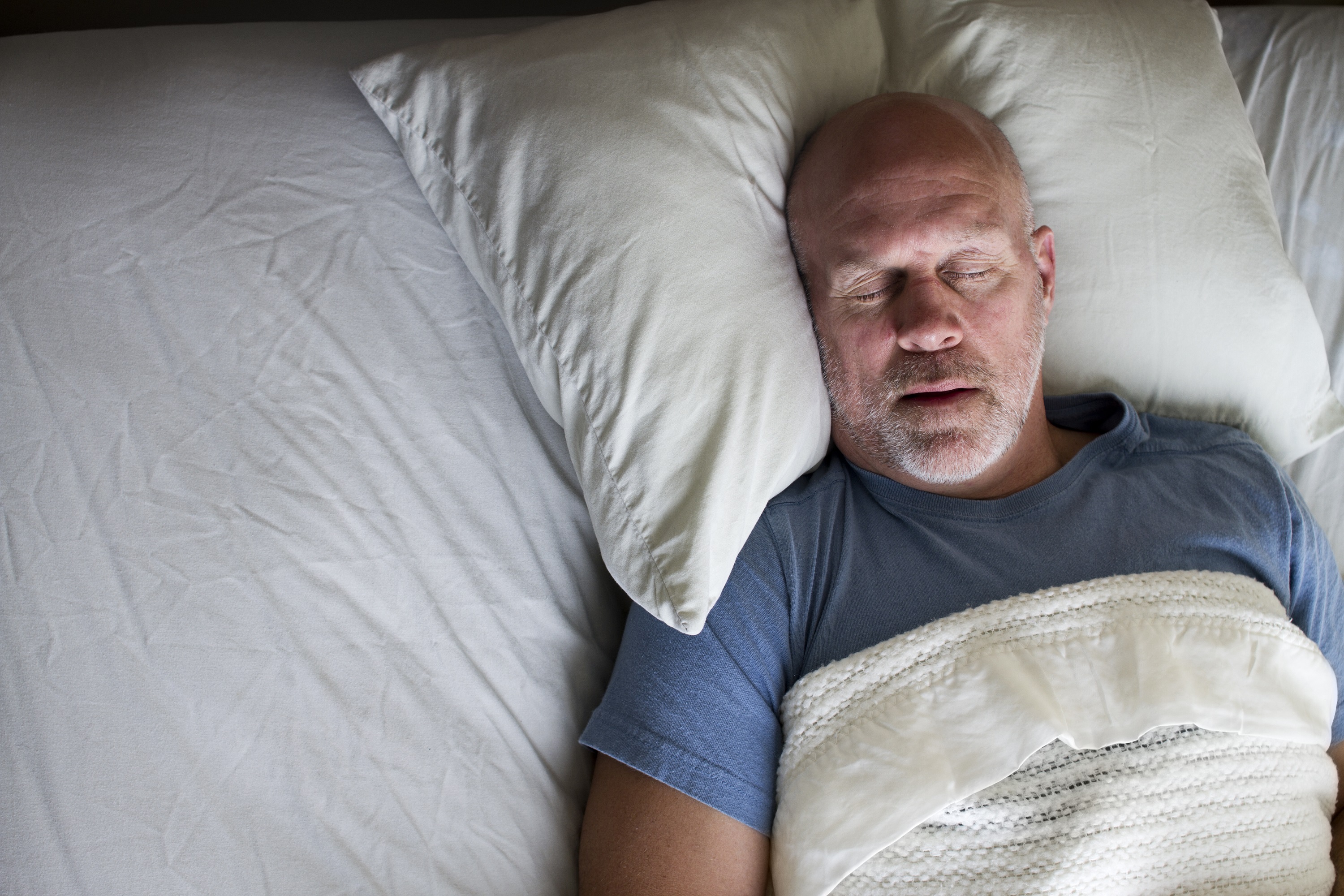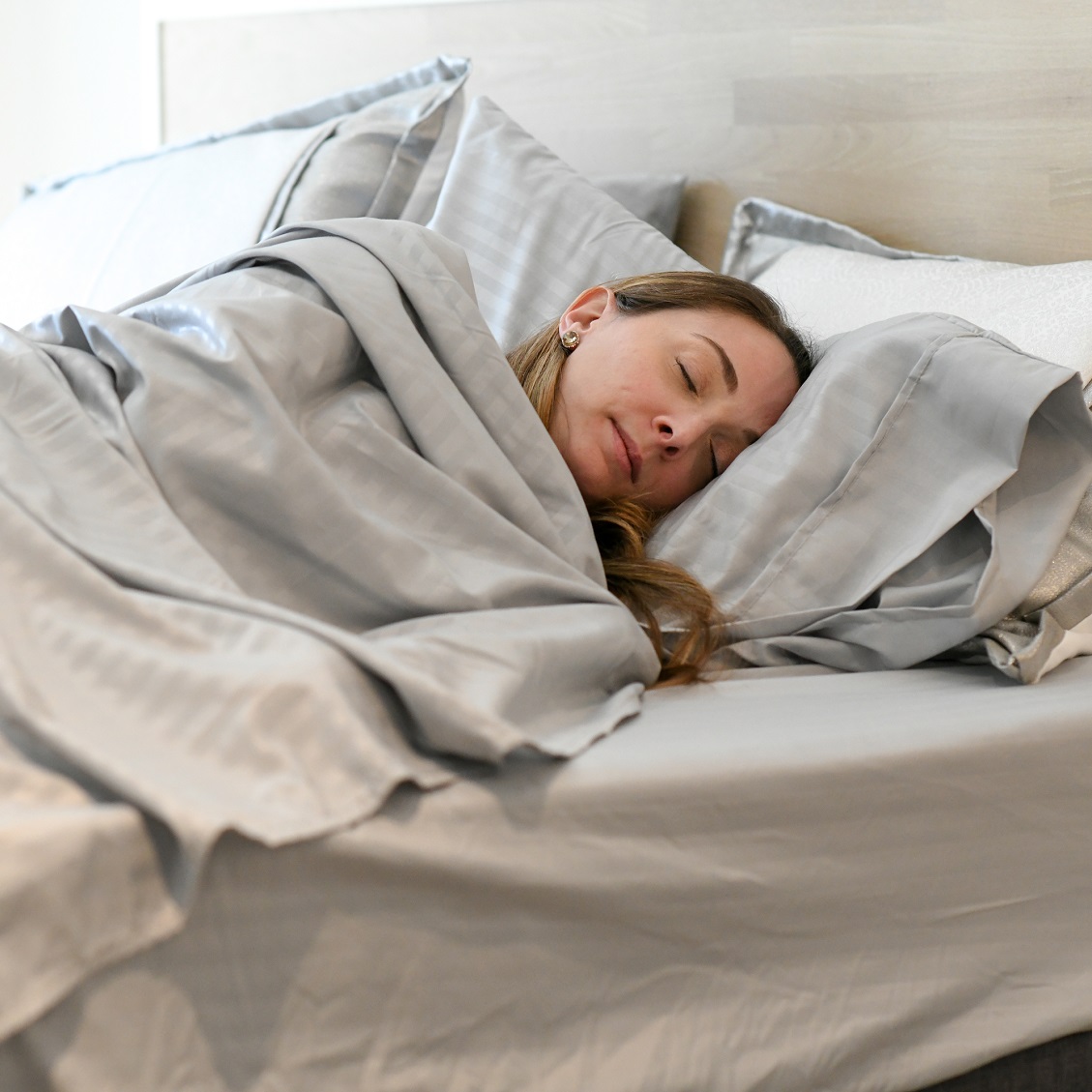When Snoring Is a Sign of a Health Problem

March 29, 2022
Sawing wood. Rumbling thunder. Whatever you call it, snoring can be a nuisance to anyone trying to sleep who’s within earshot of a snorer. But snoring may also be a sign of obstructive sleep apnea, a condition that may increase the risk of high blood pressure, heart attack or stroke.
If someone you love keeps you awake with their nocturnal noises, encourage them to see a doctor to determine the cause of their snoring. And if someone says that you snore, pay attention.
“It’s very common for spouses and bed partners to be the one who drags their significant other, who’s kicking and screaming en route, to see the sleep doctor,” says Pakkay Ngai, M.D., a pediatric pulmonologist and sleep medicine specialist at Hackensack University Medical Center and medical director of the Palisades Sleep/Wake Center. “It’s estimated that one half of people who regularly snore would turn out to have documented obstructive sleep apnea, if they went on to further testing.”
Causes of snoring
Adults often snore because of the shape and size of structures within the mouth, including the tongue, jaw, soft palate and uvula, (which hangs down from the soft palate). Children may snore due to enlarged tonsils or adenoids.
“When you sleep, the muscles of your throat relax, your tongue falls backward, and your throat becomes narrow and floppy,” Dr. Ngai says. “As you breathe, the walls of the throat begin to vibrate, leading to those sounds of snoring. And the more narrow your airway becomes, the greater the vibration and the louder your snoring.”
Snoring that happens because the airway is blocked may signify sleep apnea. How loud someone snores can’t determine whether they have sleep apnea; pauses in regular breathing or gasping for breath may be a better indicator. If your partner says that you stop breathing in the middle of the night, see a doctor for evaluation.
Symptoms of sleep apnea
You may feel tired when you wake up because of sleep apnea.
“If you fall asleep and start to breathe less effectively, your brain could startle and arouse you, and prevent you from going into deeper stages of sleep, where it feels like you never slept or barely slept,” Dr. Ngai says.
Men and people who are overweight or obese are at greater risk of sleep apnea. If you frequently awaken tired and have these symptoms, tell your doctor:
- Morning headaches
- Difficulty concentrating during the day
- A change in your ability to recall information
- Irritability or depression
- High blood pressure
- Sexual dysfunction
- Dry mouth and/or extreme thirst upon awakening
A sleep medicine specialist may recommend a sleep study to monitor your brainwave activity, breathing patterns, blood-oxygen levels and sleep quality. The results may show whether you have sleep apnea and/or frequent mini-awakenings which prevent you from getting deep sleep.
Techniques that may help you snore less
If a doctor determines that you have sleep apnea, they may recommend:
- A continuous positive airway pressure (CPAP) machine
- An oral appliance that’s fitted by a dentist or orthodontist
- Nasal spray
- Surgery
If a doctor confirms that you don’t have sleep apnea but you’re a loud snorer, nasal breathing strips may help. But these strips or other home remedies may be hazardous for someone with potential sleep apnea who self-diagnoses and thinks that their problem is resolved because they’ve stopped snoring.
“Even if you did eliminate the noise, there could still be the fundamental problem with your breathing during sleep which is not being addressed,” Dr. Ngai says. “A lot of these partial solutions really only address the nasal area, opening up the area around the nostrils, but much of the snoring originates farther back, in that space behind the palate and behind the tongue.”
Other techniques which may help quiet snoring include:
- Losing weight
- Avoiding alcohol for three to four hours before bedtime
- Going to sleep at least three hours after eating a meal
- Not taking sedatives or antihistamines at bedtime
- Establishing a consistent bedtime and wake-time, so you don’t rely on sleeping pills
- Sleeping on your side, not your back
Next Steps & Resources:
- Meet our source: Pakkay Ngai, M.D.
- To make an appointment with Dr. Ngai, or a doctor near you, call 800-822-8905 or visit our website.
The material provided through HealthU is intended to be used as general information only and should not replace the advice of your physician. Always consult your physician for individual care.
Find a doctor near me
Is Magnesium Good For Relaxation & Sleep?

Improve sleep and relaxation with magnesium. Dr. Leopold explains magnesium's benefits and how to incorporate it into your diet. Learn more & schedule an appointment.
Suffering from Obstructive Sleep Apnea? Here’s a CPAP Alternative

An innovative implantable treatment for obstructive sleep apnea offers new hope for better sleep.
Find a doctor near me

Can Wearables Help You Sleep Better?
Improve your sleep? Learn how wearables may help. Dr. Pristas shares insights. Get expert advice; call 800-822-8905.

How to Identify Early Signs of Stroke
Recognize stroke symptoms? Learn early stroke signs from Dr. Pavuluri. Get timely medical attention to reduce disability risk.

Are Naps Good for You?
Learn about the benefits and drawbacks of napping. Short naps may improve alertness, but don't replace nighttime sleep. Get tips for healthy napping habits.

6 Reasons Your Heart Rate is High
High heart rate? Learn 6 common causes from Dr. Moosvi. Understand your symptoms & find relief. Call 800-822-8905.
